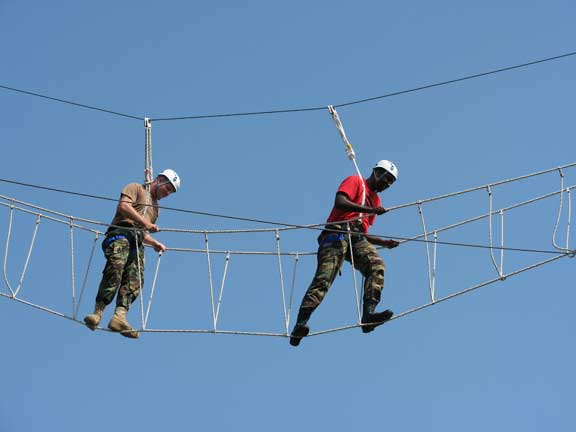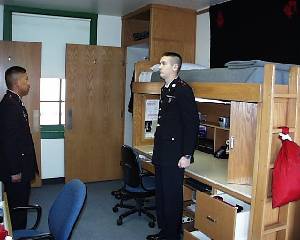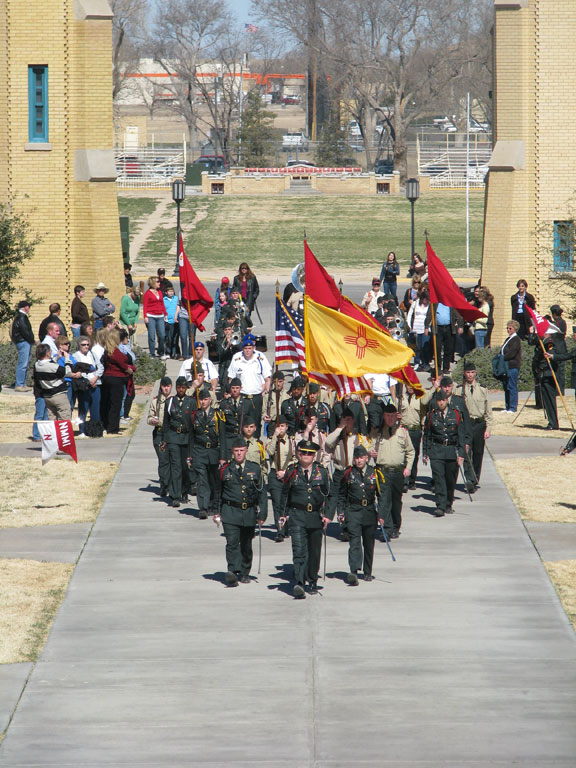|
Click on any of the following links for information:
The Corps of Cadets is rich with tradition and is essentially a leadership laboratory. It is an important experiential learning environment which substantially contributes to cadet learning and development. The Corps operates within a structured military environment with a cadet chain of command under the direct supervision of the Commandant of Cadets and his staff. The cadet chain of command is composed of senior cadets who have demonstrated the ability to supervise and train junior cadets. Cadets are trained and held to the highest standards with the following learning outcomes:
- Know and live by NMMI standards of conduct
- Respect for authority, self-control, self-discipline and personal accountability
- Become a productive team member with respect and consideration for others
- Making the right choices and avoidance of high risk behavior
- Excellent time management skills, and an eye for attention to detail
- Military bearing, excellent personal appearance, and social etiquette
- Positive character development demonstrating personal integrity
- Adherence to the Honor Code, displaying ethical and moral behavior
- Demonstrate leadership skills with respect to authority, responsibility and accountability
- Successfully live in a shared community environment and develop a healthy lifestyle
- Demonstrate knowledge of NMMI customs and traditions
Cadet Status and Class Descriptions
All cadets are categorized as either RATs (Recruits at Training), New Cadets, Yearlings or Old Cadets as part of the traditional New Cadet/Old Cadet system. Cadets are RATs for the first six weeks of their first semester at NMMI. At the six week mark, all RATs become New Cadets and continue their training as the newest members of the Corps of Cadets.
Yearling cadets (second semester in college or second year of high school) continue to hone their management and leadership skills. They may be given supervisory responsibilities over new cadets. During this period, cadets are carefully coached, mentored and evaluated by adult Troop Leadership Advisors on their management skills and leadership development.
Old cadets (at least one year college or two years high school) are the primary leaders in the Corps, having the responsibilities of training the new cadets, monitoring and helping the progress of the yearlings and running day-to-day Corps operations and activities. Their performance is periodically assessed through leadership development and training exercises. They are expected to lead by example and enforce the school standards outlined in the Cadet Blue Book.
All full-time cadets are required to be unmarried (never been married), without dependents, and resident members of the Corps of Cadets, to participate in military science and physical education activities, and wear the cadet uniform.

Sixth Class (high school freshman). Approximately 65-100 high school freshmen are admitted to New Mexico Military Institute each year.
Fifth Class (high school sophomore). A cadet must have completed five-and-one-half academic units that apply toward the high school diploma. English I must be one of the units submitted.
Fourth Class (high school junior). A cadet must have completed eleven academic units to include English I and II that apply toward the high school diploma.
Third Class (high school senior). A cadet must have completed seventeen academic units to include English I, II, and III that apply toward the high school diploma and have completed all but one unit in each of the core curriculum sequences.
Second Class (college freshman). A cadet must have a high school diploma or an equivalent from an accredited high school or a GED, and meet other minimum admissions requirements.
First Class (college sophomore). A cadet must have completed 32 academic units that apply toward the associate degree and one semester in residence at the college level.
Commandant of Cadets
|
^ TOP |
The Commandant of Cadets, similar to a Dean of Students, exercises command supervision over the Corps of Cadets. The Commandant and his staff monitor the activities of the Corps of Cadets 24 hours a day, seven days a week. The Commandant’s responsibilities include:
- Ensuring the security, safety, health and welfare, physical readiness, accountability, mentorship, and leader development of every cadet
- Overseeing the disciplinary system and disposition of disciplinary issues
- Overseeing the Honor Code system run by the cadet Honor Board
- Maintaining a positive leadership environment and a culture of discipline in which each cadet can achieve academic excellence and physical readiness to maximize his/her potential
- Overseeing barracks assignment/maintenance, cadet services and support, cadet activities and entertainment, community interaction, military training within the Corps and most issues affecting daily cadet life.
The Commandant is supported in his duties by two Deputy Commandants; two Counselors; a Chaplain; a Protocol, Cadet Activities and Entertainment Coordinator; an administrative office staff; the staffs of both Junior and Senior Army ROTC; the Troop Leadership Advisors (TLAs); and the Campus Police.
Troop Leadership Advisor

The Troop Leadership Advisor (TLA) is directly responsible for the safety, security, health and welfare, mentoring, counseling, leadership development, discipline and accountability of the cadets assigned to his/her troop. He/she is responsible for helping every cadet realize his/her full potential by maintaining a positive leadership environment in which every cadet can achieve academic excellence, become a leader of character and develop a desire for lifelong physical fitness. A TLA plays a crucial role in interacting with cadets on a daily basis to develop the “whole person”. The Troop Leadership Advisor (TLA) is a key member of the Commandant’s staff and the individual most knowledgeable of each cadet and the activities that he/she is involved with on campus. The TLA directly supervises the leadership development of those cadets assigned to the Troop and focuses on the maintenance of good order, discipline, and daily cadet life within their troop. The TLA enforces regulations, policies, and procedures directly impacting the morale, welfare, administration, activities and training of up to 80 cadets. The TLA works to cultivate a positive rapport and regular communication with cadets, parents, guardians and members of the faculty and staff.
Disciplinary System
New Mexico Military Institute provides a rewarding yet demanding learning environment focuses on the “whole person.” Not everyone who applies can meet the challenges of the NMMI experience. Adherence to established standards by all cadets is at the core of leadership development and those standards must be met in order to remain a NMMI Cadet. The Institute reserves the right to dismiss, suspend, or otherwise penalize any cadet who does not properly adapt to academic, disciplinary and/or physical readiness requirements. Among the offenses that may result in suspension or dismissal are those considered to undermine the purposes, goals and mission of the Institute and compromise the standards of character and conduct expected of all cadets. These include: hazing or endangerment of any cadet; sexual misconduct; disgraceful or refractory behavior; use or possession of illegal drugs and drug paraphernalia and misuse of prescription drugs; alcohol or tobacco products; possession of weapons, knives or explosive devices; unexcused absences; or any conduct that may bring discredit upon the Institute. NMMI Policy documents, Commandant Policy letters, the Blue Book, and the NMMI Operations and Procedures Manual provide in detail the policies pertaining to the aforementioned offenses.
Lesser offenses will result in demerits, marching tours (punishment), loss of privileges and/or restriction to the campus. An excessive number of demerits is regarded as a failure or inability to adjust satisfactorily to the NMMI standards and may result in disciplinary probation or suspension. Poor academic performance may also result in academic probation or suspension.

The Honor Code and Honor System of the Corps of Cadets at NMMI belong to the Corps of Cadets and operate under the sanction of the Commandant of Cadets. The Cadet Honor Code and System, adopted in 1921 by a unanimous vote of the Corps of Cadets, is officially recognized as the primary means by which character development is accomplished at NMMI. Simply stated: A cadet will not lie, cheat, steal, nor tolerate those who do. Every cadet is obligated to support and enforce the Honor System. Violations of the code may result in serious disciplinary action, suspension or dismissal based on the recommendations of the Cadet Honor Board/Committee as finally determined by the Commandant of Cadets. New cadets are fully trained in all aspects of the Honor System, and prospective cadets are encouraged to consider carefully the implications of intolerance before joining the Corps. The Cadet Honor Manual details policies pertaining to violations of the Cadet Honor Code
The normal repeat policy for NMMI is to grant credit only for the highest grade. However, if a cadet taking a college course is found in violation of the honor code by cheating, the cadet will receive a grade awarded by the instructor (normally an “F” grade) for that course. Any repeat of that course will be assigned both grades (no academic forgiveness) for the GPA. Thus a cadet may receive both the “F” and any subsequent letter grade earned.
A furlough is a designated and authorized time when a cadet may leave NMMI overnight. Authorization for furloughs is directly related to class status, activities on the training schedule, academic grades and deportment grade. A cadet whose grades or deportment fall below a “C” average loses his/her furlough privilege. Furloughs are taken only on specific weekends designated by the Commandant of Cadets. There are three major furloughs during which all cadets must leave NMMI, Thanksgiving, Christmas, and Spring Break. The barracks and facilities are closed during these extended break periods.
|




